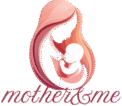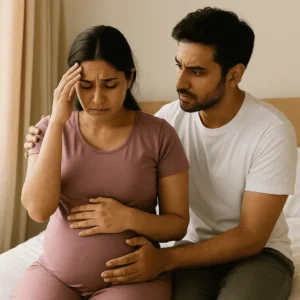Pregnancy is a transformative journey filled with excitement, questions, and emotional changes. If you’re wondering whether you might be pregnant, recognizing the earliest symptoms is the first step. This article explores the early symptoms of pregnancy, provides trusted home remedies, and explains when to take a pregnancy test—all in a clear, easy-to-understand format
Table of Contents
ToggleWhat Are the Early symptoms of Pregnancy?
The early pregnancy symptoms vary from person to person. Some women notice multiple signs, while others may only experience a few. Understanding these symptoms from pregnancy can help you make informed decisions early on.
1. Missed Period

A missed period is often the earliest and most noticeable sign of pregnancy.
- If your menstrual cycle is regular, this is a strong indicator.
- With irregular cycles, it’s best to look for additional symptoms before confirming.
2. Morning Sickness
Despite the name, morning sickness symptoms can happen any time of day. Common signs include:
- Nausea or vomiting
- Aversion to specific foods or smells
- Increased saliva
Related Post :Why Morning Sickness Happens & 5 Simple Remedies
Remedies:
- Eat small, frequent meals
- Drink ginger tea
- Avoid strong odors
If symptoms are severe, consult a doctor to rule out hyperemesis gravidarum.
3. Breast Changes

4. Fatigue
Feeling more tired than usual? Fatigue is a common early pregnancy symptom. How to cope:
- Get plenty of rest
- Eat iron-rich foods like leafy greens and lentils
Go for short walks to boost energy
5. Frequent Urination
Early in pregnancy, hormonal changes can increase blood flow to your kidneys, causing frequent urination.
- This can begin within the first 72 hours of pregnancy symptoms and may continue into later stages.
6. Mood Swings
Emotional ups and downs are normal due to hormone shifts. Tips to manage:
- Talk to supportive friends or family
- Try meditation or gentle yoga
7. Food Cravings and Aversions
Hormonal changes may trigger strange cravings or strong aversions.
- You might crave sweets, salty snacks, or unusual food combinations
- Common aversions include spicy or greasy foods
8. Mild Cramping
Light cramping during the first trimester may result from the fertilized egg implanting in the uterus. Safe remedies:
- Stay hydrated
- Use a warm (not hot) compress
- Rest when needed
When Do Pregnancy Symptoms Start?
Most pregnancy symptoms begin about one to two weeks after conception. During the first 72 hours of pregnancy symptoms, some women report:
- Light cramping
- Mild fatigue
- Mood changes
Being aware of these early signs helps with timely detection and care.
What are Pregnancy Symptoms Before a Missed Period?
Wondering about pregnancy symptoms before missed period? These may include:
- Light spotting or implantation bleeding
- Bloating and mild cramps
- Breast sensitivity
- Sudden food aversions or mood swings
These are often the earliest pregnancy symptoms, though not everyone experiences them.
When Should You Take a Pregnancy Test?
A common question is: how soon can you take a pregnancy test?
Here’s what you should know:
- The earliest you can take a pregnancy test is 6–8 days after ovulation.
- For more accurate results, wait until the day after your missed period.
- Use a best early pregnancy test to detect low levels of hCG.

Testing tips:
- Take the test in the morning, when hormone levels are most concentrated
- Follow the instructions carefully
If you get positive pregnancy tests, consult your doctor to confirm and begin prenatal care.
Natural Remedies for Early Symptoms
Here are some gentle remedies to manage early pregnancy discomforts:
Symptom | Remedy |
Morning sickness | Ginger tea, bland foods, small frequent meals |
Cramping | Warm compress, hydration, rest |
Iron-rich foods, naps, light walking | |
Breast tenderness | Supportive bra, cool compress |
Mood swings | Journaling, meditation, supportive conversation |
Constipation/Bloating | Fiber-rich foods, warm water, light movement |
Final Thoughts
Recognizing the early symptoms of pregnancy allows you to take early action. Whether you’re dealing with morning sickness symptoms, wondering when to take a pregnancy test, or noticing uncommon signs of pregnancy, trust your instincts and listen to your body.
If you suspect you’re pregnant:
- Take an early pregnancy test.
- Confirm the result with a healthcare provider.
- Begin your journey with the right information and care.
For more expert-backed content on pregnancy and parenting, visit motherandme.org — your trusted partner in motherhood.
Most home pregnancy tests are effective from the first day of a missed period. Some sensitive tests claim to detect pregnancy earlier, but testing too soon can lead to false negatives. For the most accurate result, it’s advisable to wait until after a missed period.
Yes, some individuals report experiencing symptoms like fatigue, nausea, or breast tenderness before a positive test. However, these symptoms are not definitive proof of pregnancy. A pregnancy test is necessary to confirm.
A faint positive line often indicates early pregnancy. It’s recommended to retest after a few days or consult a healthcare provider for a more definitive test, such as a blood test.
Yes, reputable sources like Verywell Health and Parents.com provide comprehensive information on early pregnancy symptoms and guidance
Technically, no — it’s too early. Fertilization can happen within 24 hours of ovulation, but implantation (when the pregnancy hormone hCG starts being produced) usually occurs 6–10 days after ovulation.
However, some women report feeling “different” — more tired, bloated, or moody — within a couple of days. This is more likely due to hormonal changes than pregnancy.
This is a very common question. Anxiety, PMS, and anticipation can mimic many early pregnancy symptoms like:
- Breast tenderness
- Cramps
- Fatigue
- Nausea
The best course of action is to wait until your period is due and take a home pregnancy test. If symptoms persist or you’re unsure, consult a healthcare provider.
Some women notice symptoms as early as 5–6 days after ovulation, especially implantation cramping or spotting. Most common symptoms begin:
Around week 4–5 of pregnancy (about the time of your missed period)
Morning sickness often starts around week 6
👉 Every woman is different; some feel nothing early on, while others are highly sensitive to hormonal changes.



